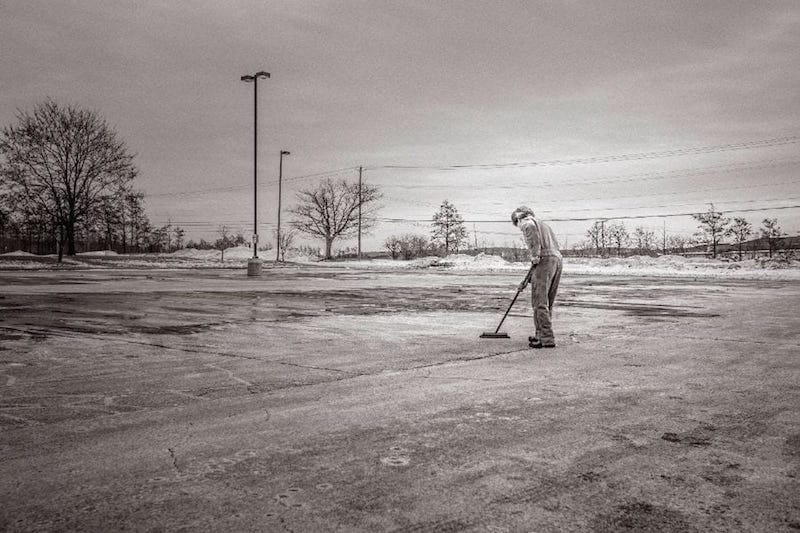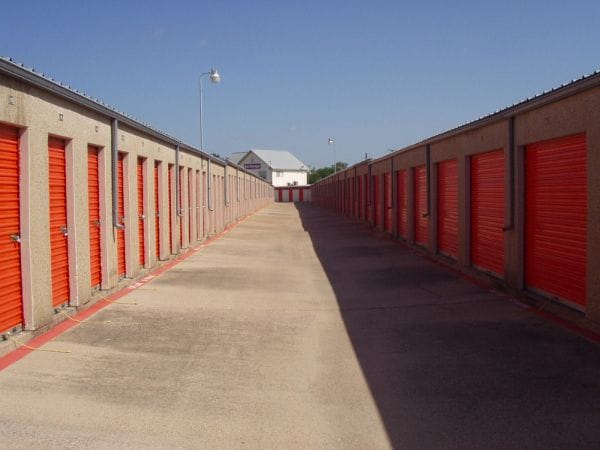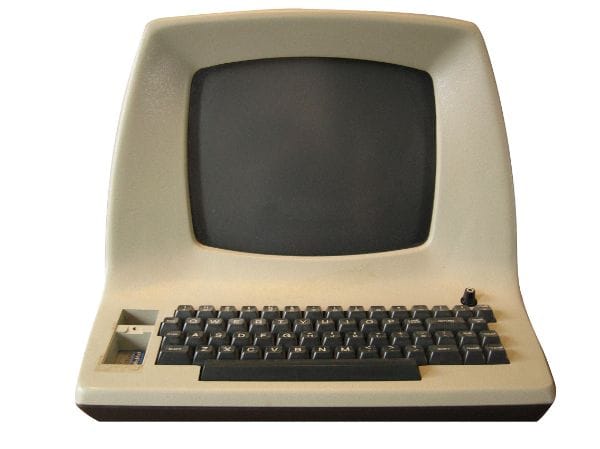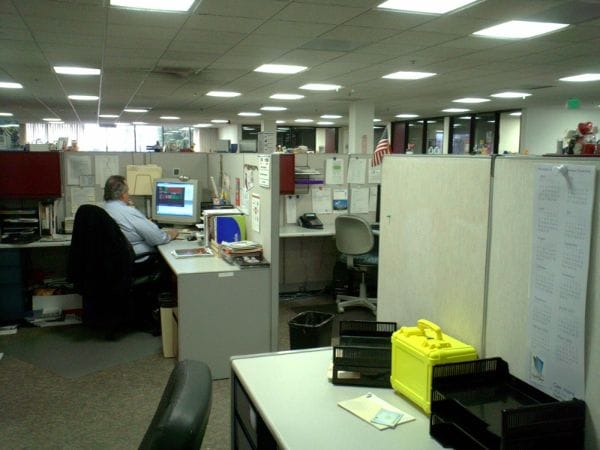
One of the cooler things going across the interwebs in the last few days has been the #firstsevenjobs hashtag - prompting people to list, in order, their first seven jobs. It’s a great study of seeing where people started from and it’s fun to look back on where you’ve been and what you’ve learned.
Here’s my first seven jobs and what I learned in each:
#firstsevenjobs
— Chris Durheim (@keepthrifty) August 9, 2016
Babysitter
Pick up Garbage in Parking Lots
Wax Storage Unit Doors
Busboy
Data Entry
Filing
Medical Device Engineer, Manager
1. Babysitter (age 11-12)
For most young kids looking to hustle this one shows up on the list; decent hours, good pay, and hey, you’re just getting paid to play, right?
Ok, we all know it’s not that simple, but I used to get paid a solid $3-4 an hour to watch the neighbor kids (in the mid-90’s) and most of my experiences were pretty positive.
The worst moment of this job though was when my mom, signed me up to watch someone without asking me first.
That wouldn’t have been a big deal if it weren’t for the fact that I really didn’t like watching this kid.

On the list of things I dreaded, babysitting him ranked right up there with cleaning my room and moving more than 6 inches from the wall during a middle school dance.
Lesson 1: Good money doesn’t beat miserable work (Tweet this )
After I got done with that session, I told my mom to never sign me up for work again - that I needed to be in charge of my own commitments.
Lesson 2: If you don’t manage your commitments, someone else will (Tweet this )
Babysitting only lasted for a couple of years for me - I’m an introvert and preferred not having my time ruled by someone else’s needs. That’s when a surprisingly sweet opportunity dropped in my lap.
2. Picking up Garbage in Parking Lots (age 12-18)
My dad had a business friend that owned a few office buildings around the Twin Cities, where I grew up. He’d noticed the amount of garbage that piled up along the curbs, in the sidewalks, and around the grounds of his buildings and wanted a cheap way to make his properties nicer.
Enter cheap labor
My brother and I were offered to work on the job with some fairly amazing terms. It took about 3 hours of driving to get between the properties so the property manager was willing to pay us not just for our time cleaning, but also for mileage and for the time driving between.
I got paid $5/hour while in the car and $10/hour while we were actively cleaning (my brother’s rates were $10 and $15 per hour and he got mileage since he could actually drive). In our fastest weeks this meant I’d get about $20 for 3.5 hours of work. In the spring when the snow melted, we might spend an entire day cleaning and I’d take home $65.
As I got older, I eventually took over the job from my brother and got the raise. That meant the fastest weeks got me $37.50 and the busiest ones got me over $100.
So, good money but the work was pretty bad, right? I spent most of my time fishing these out of the cracks between sidewalk slabs:

Lesson 3: People are disgusting. Seriously - pick up your trash. (Tweet this )
There was one major difference between this and what I learned in Lesson 1 earlier - this job had a lot of latitude. I could listen to music in the car, be with my thoughts, and take breaks when I felt like it.
Lesson 4: Even a terrible-sounding job can be manageable if you’re given enough autonomy (Tweet this )
3. Waxing Storage Unit Doors (age 13)
Shortly after starting in our parking lot cleaning job, we got another opportunity for some seemingly thankless (but well-paying) work over the summer.
The same property manager owned an outdoor storage facility and wanted to make the place look nicer by polishing the storage unit doors.
The process the property manager gave us was simple - dip rag in polish, rub on door, wait for polish to dry, rub off dry polish.
Unfortunately, this didn’t turn me into a karate master, but it was the promise of a way to fill my time in the summer with some good, outdoor work that would pay well enough.
It all started fairly well. The work was hard and grueling (getting polish off of a small garage door takes a lot of time when you include all the grooves between panels) but we listened to music and got a bit of a tan.
About once every other week, the property manager would trash stuff from units where people had stopped paying their bills. Their stuff got evicted to the dumpsters
I always hoped there’d be something worthwhile that made it to the trash heap, but the best I found was a non-functioning boom-box.
Lesson 5: People have a lot of junk they seriously don’t need (Tweet this )
After a couple weeks, we were about halfway done with the first row of doors.

Reality sank in - there was no way we were going to get this done by the end of the summer without help. Add in the fact that the property manager was withholding payment until the work was done and we knew we needed a solution.
We started recruiting friends and neighbors; really anyone with time looking for a few extra dollars. With extra help though came more distraction and less-disciplined workers.
Polish splashed on the structure and wouldn’t come off as it dried in the grooves of the brick; kids would work for a couple days and then bail, realizing how hard the job was on their hands and arms.
Lesson 6: Not every employee is going to feel the same responsibility you do to get a job done right (Tweet this )
By the end of the summer, we still had about a third of the job to do and I needed to head back to school.
My brother, who was out of school at the time and free during the day, continued to work the job until it was done.
That’s when the bomb hit.
The property manager was upset about the polish on the sides of the structure and he felt we hadn’t done a good enough job getting the polish out of the grooves between the door panels (nevermind the fact that we weren’t allowed to open the doors to get in the crevices).
His solution? He refused to pay us. We spent the better part of a summer doing thankless work and didn’t even get paid in the end. Worst off, my brother had done the most work and felt guilty for the helpers not getting paid so he paid them out of his own pocket.
Lesson 7: Know what your boss is looking for and validate you’re on the right track before going further (Tweet this )
Lesson 8: Know how you’re going to get paid and make sure you’re comfortable (Tweet this )
4. Busboy (age 14)
At this point, I still had the parking lot cleaning job, but it was one that didn’t scale well. You couldn’t clean when it was dark out and setting up with other property managers would have complicated getting paid to drive (who pays for which miles if I group buildings in the same trip?).
My dad helped a restaurant move into a strip mall near our house and they were looking for service staff - I figured it was worth a shot.
This was the beginning of my career as a busboy. $4.25 an hour plus a small cut of the wait staff’s tips. It wasn’t great, but I also got a free meal every night I worked - a good way to end the night!

By the end of my first night, my back and feet were killing me and I was exhausted. I hadn’t thought of how physical the job would be, but it really was a constant on-the-go job.
Boredom set in quickly - I didn’t have much choice in what I was working on and even when I did, I’d get yelled at for things beyond my control (when three large tables all leave at the same time there’s no way to clean them all up fast enough).
Lesson 9: Tip well unless it’s clear that the staff was doing a really bad job. They depend on your tips! (Tweet this )
In addition, I didn’t feel like I was developing any meaningful skills. This was largely true with my prior jobs, but at this age I started to itch for something that I could progress at.
Lesson 10: A job that doesn’t play to your skills will get tiresome pretty quickly (Tweet this )
I lasted for about 6 months, then gave up my shift to my other brother who seemed to be enjoying it much more than I was.
Time for something a bit more up my alley…
5. Data Entry (age 15-19, 21)
I’d always had an interest in computers and had spent plenty of time using them, so when an opportunity came up to do some data-entry work at a local company, I jumped at the chance.
The work was rote, but at $10/hour, I wasn’t one to complain too much. I got lots of time to jam out in a cubicle, listening to my favorite CDs.
As a drummer, I really appreciated the rhythm you could get into while flipping pages and transcribing what you saw.
We weren’t working with the latest technology, but it was still a great-paying job with a lot of flexibility.

I did this in various capacities for a few companies throughout high school and early college; at the time, getting data into computers was a fairly manual process, so people with decent typing skills and attention to detail could do pretty well for themselves.
That said, I knew I wanted to head somewhere bigger with a higher ceiling when I graduated college, so I decided to major in Computer Engineering.
Lesson 11: A job without meaning isn’t much better than a job with no pay (Tweet this )
6. Filing (age 20)
You’ll notice a 1-year blip in my data-entry timeline - the year that I couldn’t find a company that needed my work.
I was fortunate enough to be a college student living at home for the summer, so I didn’t have to worry about a roof over my head or food on the table, but being unable to find work (despite the dozens of resumes I handed out) made for a rough start to the summer.
Lesson 12: You don’t get to choose what work is available (Tweet this )
Eventually, I got an offer to help purge and file medical records for a gastroenterology clinic (I learned lots of great medical terms that summer).
The job was pretty mindless:
- (In the warehouse) Look through the medical record; if any piece of information is dated as being within the last 7 years, keep the whole file; otherwise put it in the “shred” pile
- For the records that don’t get shredded, bring to the main office and file alphabetically by name
- Repeat

I knew I could handle this for a few weeks but was fairly convinced I’d go crazy by the end of the summer.
Thankfully, I had an amazing set of people I was working with. Most were older college students that had just graduated and were looking for their first full-time job.
We listed to NPR, debated politics, religion, and talked about anything and everything going on in the world. Despite the nature of the work, this was one of the most intellectually stimulating environments I had been in.
Lesson 13: The people you work with can make a job significantly better (Tweet this )
Then everyone left.
They all got full-time jobs and that just left me to do the work.
Eventually the temp agency found two more people who could come in but the dynamic was completely different. Neither seemed to have an interest in talking about much other than fashion (which isn’t exactly my cup of tea).
On top of that, one didn’t understand the concept of alphabetizing and I spent most of the summer coaching her on where the files went.
Lesson 14: You don’t always get to choose who you work with (Tweet this )
They were both nice, but I was back to square one in a job that was just about getting paid.
Thankfully there was only a month left in the summer, so I finished up my time and headed back to college.
7. Medical Device Test Engineer (age 22)
After one more year of data entry, I was getting to the point that graduation was getting near; I had 3 semesters left and no line-of-sight to a full-time job.
Despite getting a decent GPA in a marketable degree, I knew I was going to struggle finding a full-time job if I didn’t have some more relevant experience to point to going in.
I’d been attending engineering career fairs my whole college career and never seemed to get past the resume stage.
They all seemed to say “we’re looking for someone with more experience”. Seems like a bit of an unbreakable cycle - I was looking to get some experience but couldn’t because I didn’t have enough?
I ran into one of my friends from the dorm that I hadn’t seen in a while and asked what he was up to. He’d been working for a semester at a local medical device manufacturer, testing how the device was designed before they built it and sold it to customers.
I hadn’t ever thought to get into the medical side as a computer engineer, but he seemed to like it and assured me he’d give me a good word.
I interviewed and got offered an 8-month term doing the same role as my friend.
Lesson 15: Networking is one of the best ways to find a good job (Tweet this )
This was my first real corporate job and ended up being the place I stuck for the last 12 years.

In this time, there have been ups and downs, but I can say that I’ve consistently had a challenging job that grows my skills every year, working on something with a true purpose with some of the brightest and coolest people I’ve had a chance to know.
I feel lucky to have gotten here and to be paid well along with everything else :)
Since starting there, I’ve advanced to leading other engineers, leading projects, and for the last 7 years I’ve been managing other engineers, working hard to make their careers meaningful, exciting, and impactful.
The Rest of the Story
This only covers me through age 34. What the future holds is anyone’s guess, but I know the things that have made for great work and what hasn’t. The biggest thing I’ve learned is that you really have to own your career and push for what you want.
While every step along your career path isn’t going to be glamorous, don’t settle. Push yourself to get something better.
Search for a challenge; search for purpose; search for a chance to work on your skills, and find a team with amazing people. You deserve the opportunity for great work!
What have you learned in your career? Any major regrets or nuggets you’d like to share?
